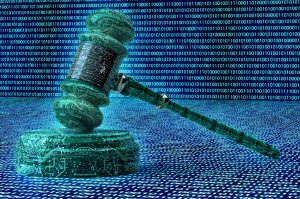
(Image via Getty)
In 2012, the American Bar Association revised the Model Rules of Professional Conduct — the model code of ethics for lawyers — to make clear that lawyers have a duty to be competent not only in the law and its practice, but also in technology.
Specifically, the ABA amended Comment 8 to Model Rule 1.1, which pertains to competence, to say that lawyers have a responsibility to keep abreast of changes in law and practice, “including the benefits and risks associated with relevant technology.”
This so-called duty of technology competence is a topic I’ve written about frequently. At my LawSites blog, I keep a running tally of the states that have formally adopted the model rule. So far, that number is 36.
Just as there is a model code of conduct for lawyers, there is a corollary model code of conduct for judges. That code, however, contains no parallel duty of technology competence for judges. Most states also have codes of judicial conduct. As far as I can tell, none of those state codes explicitly require technological competence for judges.
Why not?
The rationale for requiring tech competence of lawyers is that technology permeates every aspect of law practice. A lawyer cannot effectively practice law these days without using technology, and a lawyer cannot effectively represent clients without understanding the technologies the clients use.
The same holds true for judges. Just as technology permeates law practice, it permeates the work of judges. Court operations, court dockets, and even the courtrooms themselves are increasingly driven by technology. And the issues judges must rule on in those courtrooms — both substantive and evidentiary — increasingly implicate matters of technology.
Consider the myriad ways in which a judge’s responsibilities intersect with technology:
- Oversight of the use of courtroom presentation and recording technology;
- Ruling on issues of evidence and discovery involving digital sources;
- Deciding cases involving issues of technology — sometimes highly complex issues;
- Understanding the cultural and sociological implications of technology; and
- Ethically using technology and social media in their own professional and personal lives.
Marla N. Greenstein, executive director of the Alaska Commission on Judicial Conduct, said it well when she wrote in a 2014 article in The Judges’ Journal:
Both the effectiveness of an individual judge and the imperative to promote confidence in the judiciary require technological literacy.
Take eDiscovery. It is a technologically complex area of law — both in the technology used to conduct discovery and in the technology systems that are the sources of discovery. Yet how many judges really understand the eDiscovery issues that they are routinely required to rule on?
The 2019 judges survey conducted by Exterro and EDRM at Duke Law asked federal judges whether they are satisfied with their level of knowledge of eDiscovery technology and practices. Of the 260 judges who responded, less than a third said they require no additional training or education. The rest said they needed either additional training or extensive training.
The survey also asked whether federal judges in general should receive more training and education on eDiscovery technology or practices. Seventy percent said they should receive more training, and another 8 percent said there should be “extensive increases” in training for judges.
That survey covered only federal judges and only eDiscovery. There are no benchmarks or data I could find about the competence of federal and state judges when it comes to other types of technologies and other issues related to technology. But I would be willing to bet that there are plenty of lawyers out there who have stories to tell about judges’ use and understanding of technology.
Just recently, a judge in New York resigned while facing formal charges by the New York State Commission on Judicial Conduct related to technological incompetence. Among other things, the judge was charged with failing for more than three years to monitor his official court email account or respond to emails sent to that account and failing for more than a year to activate or use a computer and software provided to him by the Office of Court Administration for financial and case administration.
In the Model Code of Judicial Conduct, the corollary to Model Rule 1.1 on competence is Rule 2.5, which says, “A judge shall perform judicial and administrative duties, competently and diligently.” The comment to Rule 2.5 elaborates:
Competence in the performance of judicial duties requires the legal knowledge, skill, thoroughness, and preparation reasonably necessary to perform a judge’s responsibilities of judicial office.
Greenstein, in The Judges’ Journal article mentioned above, suggests that this comment encompasses some degree of technological competence:
In our world today, this includes competence to assess the quality of Internet legal research, the ability to properly determine use of court e-mail systems to communicate with attorneys and parties, and the ability to evaluate possible social media stalking in a domestic violence matter.
Of course, there were some who argued that Rule 1.1 encompassed technological competence even before the 2012 revision of Comment 8 made it explicit. But it was the act of making it explicit that brought about a sea change in lawyers’ perceptions of what is expected of them.
The same would be true for judges. Perhaps some degree of technological competence can be inferred from Rule 2.5. But why leave it to inference? Making it explicit would bring about the same sea change for judges as Rule 1.1, Comment 8, has done for lawyers.
Let those who set the conduct rules for judges issue a wake-up call. The time has come for there to be an explicit duty for judges to be technologically competent, just as there is already for lawyers.
 Robert Ambrogi is a Massachusetts lawyer and journalist who has been covering legal technology and the web for more than 20 years, primarily through his blog LawSites.com. Former editor-in-chief of several legal newspapers, he is a fellow of the College of Law Practice Management and an inaugural Fastcase 50 honoree. He can be reached by email at ambrogi@gmail.com, and you can follow him on Twitter (@BobAmbrogi).
Robert Ambrogi is a Massachusetts lawyer and journalist who has been covering legal technology and the web for more than 20 years, primarily through his blog LawSites.com. Former editor-in-chief of several legal newspapers, he is a fellow of the College of Law Practice Management and an inaugural Fastcase 50 honoree. He can be reached by email at ambrogi@gmail.com, and you can follow him on Twitter (@BobAmbrogi).








